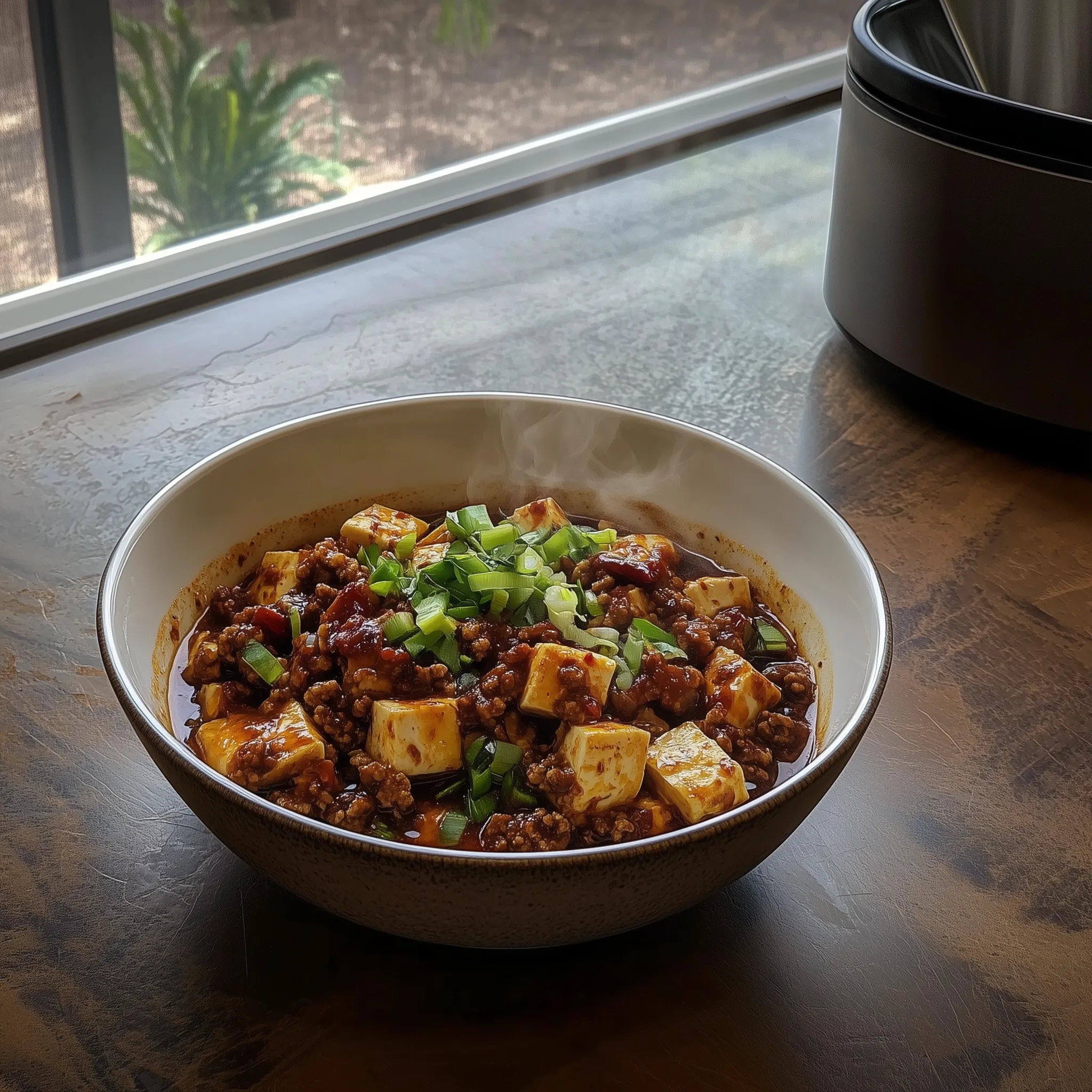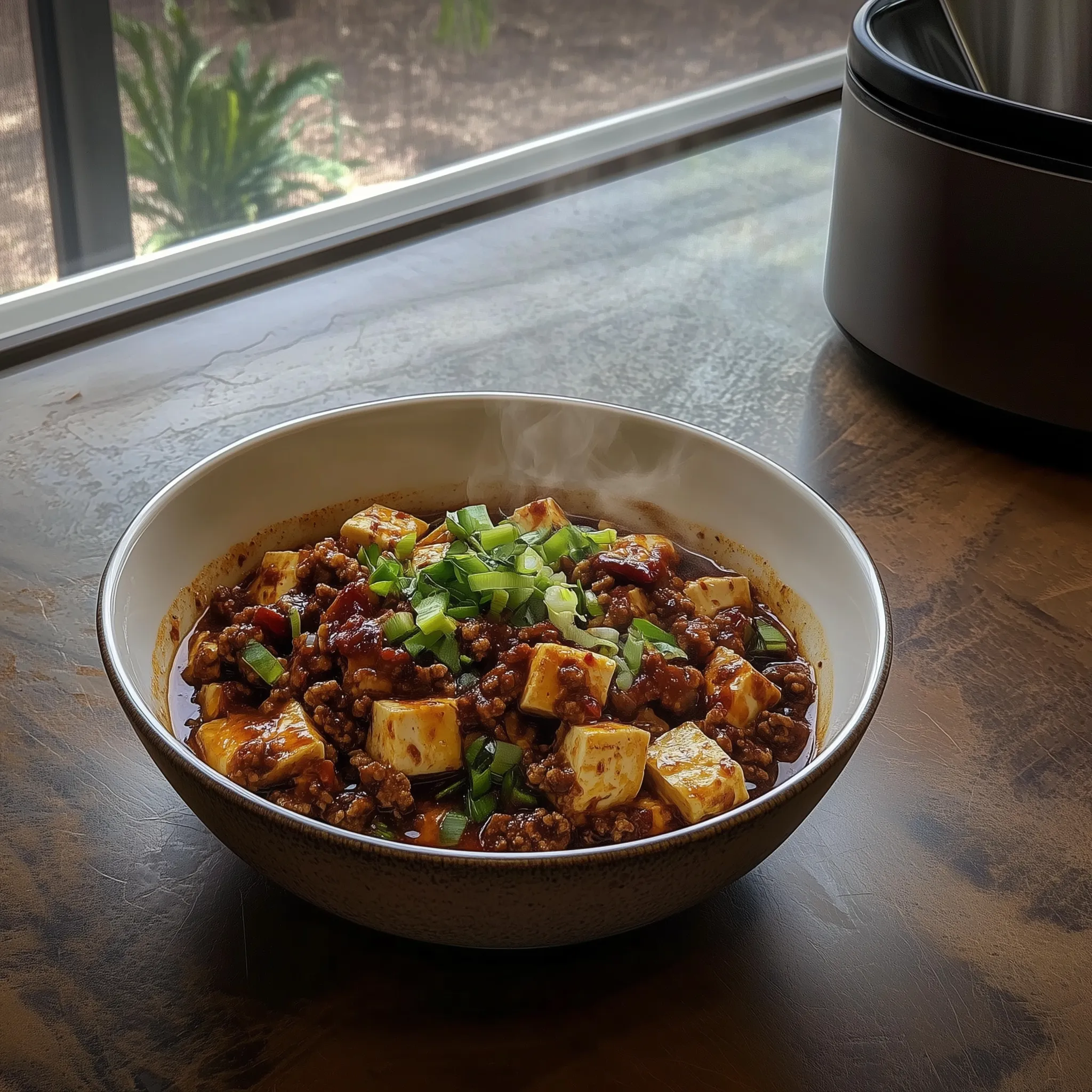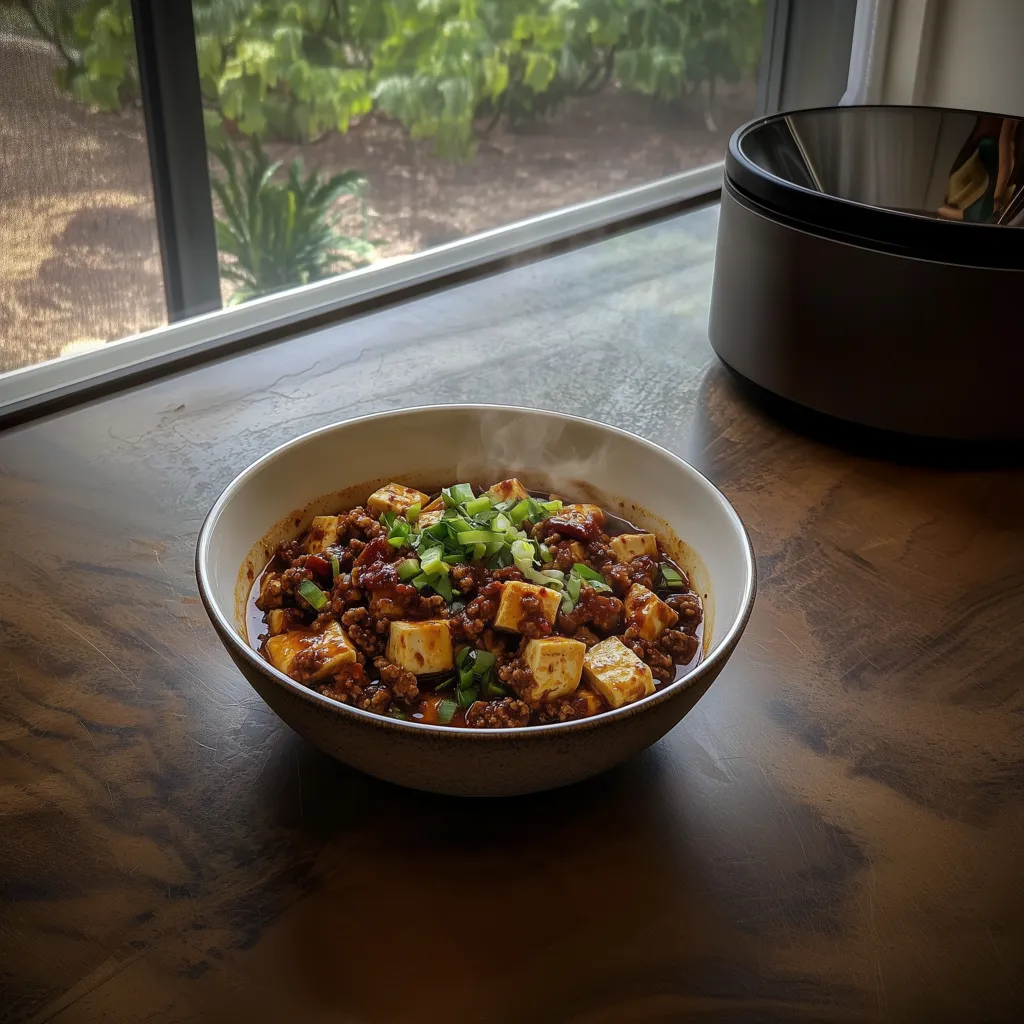 Save
Save
This classic Mapo Tofu recipe brings authentic Sichuan flavors right to your dinner table. With its perfect balance of numbing Sichuan peppercorns and spicy chili bean paste, this dish transforms simple tofu into a memorable meal that's ready in just 20 minutes.
I first made this recipe after returning from a trip to Chengdu, trying desperately to recreate the incredible flavors I experienced there. After several attempts, this version finally captured that perfect combination of heat and flavor that transports me right back to that tiny restaurant in China.
Ingredients
- 2 tablespoons Sichuan peppercorns divided provides that essential numbing quality that defines Sichuan cuisine
- 1/4 cup vegetable oil neutral flavor allows the spices to shine
- 1 teaspoon cornstarch creates the perfect silky sauce texture
- 2 teaspoons cold water for mixing with cornstarch
- 1 1/2 pounds medium to firm silken tofu the star of the dish with a delicate texture that absorbs flavors
- 1/4 pound ground beef adds richness and depth to the sauce
- 3 garlic cloves freshly grated for maximum flavor impact
- 1 tablespoon fresh ginger adds bright spicy notes that balance the dish
- 2 tablespoons fermented chili bean paste the key to authentic flavor with complex spicy fermented notes
- 2 tablespoons Xiaoxing wine adds depth and removes any gaminess from the meat
- 1 tablespoon dark soy sauce provides color and umami richness
- 1/4 cup low sodium chicken stock creates the base for the sauce
- 1/4 cup roasted chili oil adds beautiful red color and spicy complexity
- 1/4 cup finely sliced scallion greens fresh finish that brightens the dish
Step-by-Step Instructions
- Toast Half the Peppercorns
- Heat half of your Sichuan peppercorns in a large wok over high heat until they begin to smoke lightly. This usually takes about 1 minute and releases their essential oils for maximum flavor. Transfer to a mortar and pestle and grind until fine. This will be your finishing spice that adds that signature numbing quality at the end.
- Infuse the Oil
- Add your remaining whole Sichuan peppercorns and vegetable oil to the wok. Heat over medium high heat until the oil begins lightly sizzling around the peppercorns which takes about 90 seconds. Remove just the peppercorns with a wire mesh skimmer leaving that beautifully infused oil in the wok. This creates the aromatic base that will carry through the entire dish.
- Prepare the Thickener and Tofu
- Mix your cornstarch and cold water in a small bowl until completely smooth with no lumps. This slurry will give your sauce the perfect consistency. Meanwhile bring a medium pot of water to a boil and gently add your cubed tofu. Let it cook for exactly one minute which firms up the exterior while keeping the interior silky. Carefully drain in a colander being extra gentle with the tofu to maintain its cube shape.
- Create the Sauce
- Heat your infused oil in the wok until it just starts smoking. Add ground beef and stir constantly for one full minute until it begins to brown. Add your grated garlic and ginger and cook for just 15 seconds until their aroma blooms but before they can burn. Add the chili bean paste Xiaoxing wine soy sauce and chicken stock and bring to a rapid boil which melds all the flavors together beautifully.
- Finish the Dish
- Pour in your cornstarch mixture and cook for 30 seconds until the sauce thickens and becomes glossy. Gently add your blanched tofu and fold it in with extreme care to keep the cubes intact. Stir in your vibrant chili oil and half the sliced scallions and let everything simmer together for 30 seconds. Transfer immediately to a serving bowl sprinkle with your remaining fresh scallions and the toasted ground Sichuan pepper. Serve right away with steaming white rice.
 Save
Save
My personal favorite element is the contrast between the silky tofu texture and the intense flavor of the sauce. The first time I served this to friends they were shocked that tofu could taste this good. Now its requested at every dinner party I host regardless of what else is on the menu.
Finding Authentic Ingredients
The key to truly great Mapo Tofu lies in using authentic ingredients particularly the chili bean paste called doubanjiang. Look for the Pixian variety from Sichuan which has a deeper more complex flavor than other versions. Asian grocery stores typically carry it but you can also order online if necessary. The fermented beans and chili create a unique flavor that simply cannot be substituted with other chili pastes.
Adjusting the Heat Level
While traditional Mapo Tofu is quite spicy you can easily adjust this recipe to suit your preferences. For a milder version reduce the chili oil to 2 tablespoons and use only 1 tablespoon of the chili bean paste. For those who enjoy extreme heat add 1 teaspoon of ground Sichuan chili flakes along with the bean paste. Remember that the numbing quality from the Sichuan peppercorns actually makes the spice more bearable by slightly anesthetizing your taste buds.
Serving Traditions
In Sichuan households Mapo Tofu is typically served family style alongside several other dishes. Plain white rice is essential to balance the intense flavors of the dish. Consider pairing with cooling vegetables like cucumber salad or simple stirfried greens to create a balanced meal. The contrast between the fiery tofu and simple sides makes for an authentic Chinese dining experience where different flavors and textures complement each other.
Vegetarian Adaptation
This classic recipe can be easily adapted for vegetarians by omitting the ground beef and replacing the chicken stock with vegetable stock. For added texture and protein you can substitute the beef with finely chopped mushrooms preferably shiitake for their meaty quality. Cook them exactly as you would the beef adding perhaps 30 seconds more to allow their moisture to evaporate. This version is equally delicious and remains true to the spirit of the original dish.
 Save
Save
Recipe Q&A
- → What type of tofu works best for Mapo Tofu?
Medium to firm silken tofu is ideal for Mapo Tofu. It provides the right balance of tenderness while still holding its shape during cooking. Avoid using extra-soft silken tofu as it will fall apart too easily when stirred into the sauce.
- → Can I substitute the Sichuan peppercorns?
Sichuan peppercorns provide the distinctive numbing sensation (málà) that's essential to authentic Mapo Tofu. While black peppercorns won't create the same effect, you could use Sansho pepper (Japanese) or Timut pepper (Nepalese) as closer alternatives if Sichuan peppercorns aren't available.
- → What can I substitute for fermented chili bean paste?
The fermented chili bean paste (doubanjiang) is crucial for authentic flavor. In a pinch, you could mix regular chili paste with a bit of miso paste and a dash of soy sauce, though the flavor profile will differ slightly from traditional Mapo Tofu.
- → Is there a vegetarian version of this dish?
Yes, you can make vegetarian Mapo Tofu by omitting the ground beef and using vegetable stock instead of chicken stock. Some versions use finely chopped mushrooms (like shiitake) to provide a meaty texture and umami flavor in place of the beef.
- → How spicy is traditional Mapo Tofu?
Traditional Sichuan Mapo Tofu is quite spicy. The dish gets heat from both the chili bean paste and chili oil, plus the numbing sensation from Sichuan peppercorns. You can adjust the spice level by reducing the amount of chili bean paste and chili oil to suit your preference.
- → What does 'Mapo' mean in Mapo Tofu?
'Mapo' (麻婆) translates to 'pockmarked grandmother' in Chinese, referring to the woman who supposedly created this dish in Chengdu, Sichuan province. The dish has been popular since the late 1800s and is now considered a classic of Sichuan cuisine.
